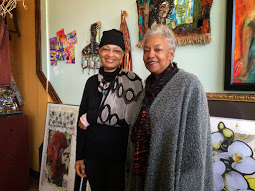
Fiber artists plan to dress up Detroit’s Avenue of Fashion
Livernois.
The Knight Arts Challenge Detroit is now accepting applications for the best local ideas for the arts. Here, writer Julie Edgar catches up with past winner Detroit Fiberworks.
Like so many others who see Detroit as a wide-open frontier, Mandisa Smith and Najma Wilson are pushing against urban blight and indifference to achieve their entrepreneurial dreams.
Only they’re a bit older than the 20-somethings streaming in to the city to stake a claim. They’ve already retired from executive and teaching careers and have always lived in Detroit. RELATED LINKS
“New documentary features Detroit Knight Arts Challenge winners” by Katy Locker, 03/30/15
“When a house is an opera: Creating spaces for art in Detroit” by Mary M. Chapman, 03/26/15
“A rich library of African-American poetry goes digital” by Julie Edgar, 3/23/15
“New York theater chooses Detroit’s Mosaic for Shakespeare production” by Julie Edgar, 3/20/15 “Detroit: Submit your idea to the Knight Arts Challenge!” by Mary M. Chapman, 3/16/15
Opening Detroit Fiberworks in 2013 was a way to do what they love in a place they love, and to play a part in the city’s resurrection.
A bit about the two women: After high school, Smith and Wilson followed their own paths. Wilson taught art at Wayne State University and in Detroit Public Schools, while Smith got her MBA from the University of Michigan and took a high-paying job in the auto industry. Decades later, when Wilson retired and Smith got laid off, they started thinking about how they could practice their respective crafts.
Both are artists who work with organic materials. Wilson, the quieter of the pair, uses surface techniques on fabric – dyeing, stitching, painting – and Smith uses felting techniques to make everything from vases to dresses. (Last week, Smith’s recently injured arm was in a sling she fashioned from one of her own gorgeous silk/felt scarves, but she was smiling: She hurt herself when she fell on the Edmund Pettus Bridge in Selma, Alabama while walking with her sister to commemorate the1965 march to demand voting rights for African-Americans. It was an amazing experience.)

Mandisa Smith (left) and Najma Wilson (right).
An urban redevelopment grant helped Smith and Wilson, both in their early 60s, to become urban pioneers and practice their arts. They opened Detroit Fiberworks on Livernois in northwest Detroit, along a few blocks known as the Avenue of Fashion. The shop, a charming amalgam of textures, colors and spicy scents, sells the work of the women and other artists, including felted clothing and scarves, painted pillows, jewelry, essential oils, paintings and more.
A bakery and a chicken-and-waffles restaurant have opened on the same block. All good – except for the cement median that bisects a long section of Livernois, cutting into space that could be used for parking outside their row of shops and forcing cars to drive further to turn around. Without any kind of plant life to relieve its dullness, it is more a nuisance than a help to merchants who are trying to make it on the avenue.
So when they heard about the Knight Arts Challenge last year, they applied and won a $20,000 matching grant that will go at least halfway in creating a fiber-arts installation for the median, something that might stretch for an entire block. Smith and Wilson also plan to use the grant to offer free fiber arts technique workshops in the studio that is attached to the store, and use students’ work for the installation.
“We want to draw more people to the Avenue of Fashion, which used to be the place to come for everything luxurious. We hope this art installation on the median will bring people, if just to see what’s going on, and to just enhance the feel of the neighborhood. That’s what public art does: create a space for conversation and community,” Smith says.
To raise the other $20,000, the women are launching a crowdfunding campaign on Patronicity.com in May. The Michigan Economic Development Corporation will match whatever they raise, and Smith and Wilson have enlisted the neighboring University of Detroit Mercy to help with logistics. They have until September 2016 to have the piece in place.
The weather will dictate how the work evolves. When it disintegrates, fades or is otherwise beaten up by the elements, they will add something new or replace the worn-out parts.
That is, after all, what Detroit is about: a constant interplay between the new and the old, the ugly and the beautiful, death and rebirth.
Julie Edgar is a Detroit-based freelance writer.
Recent Content
-
Artsarticle ·
-
Artsarticle ·
-
Artsarticle ·
